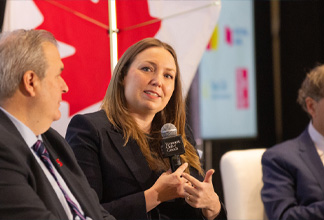Finding Inspiration When It Comes To Socially Responsible Investing
Written by Rita Silvan
Published on April 8, 2017
minute read
Share:
At first glance, the Spring 2017 fashion collection from Dutch designers Viktor Horsting and Rolf Snoeren (Viktor&Rolf) doesn't seem like a likely source of inspiration for an investor.
The designs, assembled from old, ruined party dresses from the 1940s and onward, are a patchwork of tulle, ballerina-pink duchesse satin, gold trim and lace. Eccentric — though not without their charms once you know the creation story — they're not recommended attire for an important job interview or first date. Despite the Boulevard of Broken Dreams collection title that conjures dashed hopes, the designers insist their message is upbeat: fragmented pieces can be made whole again. This aligns with a popular trend in investing — social responsibility.
Upcycling, which transforms unwanted or tired materials into new and often more valuable products, has been embraced by many Millennials looking to blaze their own style trail. One beauty of upcycling is that desirable and valuable products are less likely to end up in landfills. According to second-hand store Value Village, North Americans send around 9.5 million tonnes of clothing to landfills each year. While also offering a creative outlet, it's easy to see the "green" or "ethical" appeal of upcycling for the environmentally and socially conscious.
"In 2015, Canada's responsible-investment market had more than $1.5 trillion in assets under management, a 49 per cent jump from 2013."
Socially responsible investing has been gaining traction in recent years. In 2015, Canada's responsible-investment market had more than $1.5 trillion in assets under management, a 49 per cent jump from 2013, according to the Responsible Investment Association's 2016 Canadian Responsible Investment Trends report. The trade group says responsible investing — which melds environmental, social, and corporate governance (ESG) factors — accounts for 38 per cent of the Canadian investment industry. Assets held by individual investors in the market totalled $188 billion at the end of 2015, a whopping 91 per cent increase over two years.
Socially Responsible Investing: Digging In
So what are some considerations when it comes to socially responsible investing? Identifying what you're authentically interested in and the specific criteria that are important to you can be a good start. One way is to think about positive criteria that's important to you, such as corporate citizenship. Others may screen out investment options based on what they consider as negatives. Traditionally, socially responsible investing has tended to avoid companies involved in gambling, tobacco, alcohol or nuclear power, for example.
Typically, socially responsible companies will be leaders in good governance, environmental stewardship and humane employee practices. Digging deeper, governance factors can revolve around things like director compensation and board mandates, while environmental considerations can include emissions, water use and waste management. Social factors encompass areas such as human rights, health and safety, and community relations.
Under Canadian securities rules, public companies are required to disclose all material information, including related to environmental and social issues. On top of that, many Canadian companies have been disclosing their ESG impacts in voluntary annual reports for more than 20 years, according to a progress report last year on sustainability reporting from Stakeholder Research Associates Canada. That report showed 65 per cent of companies listed on the TSX Composite Index offer some public disclosure on their sustainability initiatives.
As an alternative to investing in individual companies, there are a growing number of socially responsible-focused funds. Last year, investment research firm Morningstar launched a new sustainability rating for global mutual funds and exchange-traded funds to allow investors a way to evaluate how they are meeting ESG issues. The rating is available for more than 20,000 funds, according to Morningstar.
RBC Direct Investing Inc. and Royal Bank of Canada are separate corporate entities which are affiliated. RBC Direct Investing Inc. is a wholly owned subsidiary of Royal Bank of Canada and is a Member of the Investment Industry Regulatory Organization of Canada and the Canadian Investor Protection Fund. Royal Bank of Canada and certain of its issuers are related to RBC Direct Investing Inc. RBC Direct Investing Inc. does not provide investment advice or recommendations regarding the purchase or sale of any securities. Investors are responsible for their own investment decisions. RBC Direct Investing is a business name used by RBC Direct Investing Inc. ® / ™ Trademark(s) of Royal Bank of Canada. RBC and Royal Bank are registered trademarks of Royal Bank of Canada. Used under licence.
© Royal Bank of Canada 2023.
There may be commissions, trailing commissions, investment fund management fees and expenses associated with investment fund and exchange-traded fund (ETF) investments. On or after June 1, 2022, any trailing commissions paid to RBC Direct Investing Inc. will be rebated to clients pursuant to applicable regulatory exemptions. Before investing, please review the applicable fees, expenses and charges relating to the fund as disclosed in the prospectus, fund facts or ETF facts for the fund. Mutual funds are not guaranteed, their values change frequently and past performance may not be repeated. For money market funds there can be no assurances that the fund will be able to maintain its net asset value per security at a constant amount or that the full amount of your investment in the fund will be returned to you.
Any information, opinions or views provided in this document, including hyperlinks to the RBC Direct Investing Inc. website or the websites of its affiliates or third parties, are for your general information only, and are not intended to provide legal, investment, financial, accounting, tax or other professional advice. While information presented is believed to be factual and current, its accuracy is not guaranteed and it should not be regarded as a complete analysis of the subjects discussed. All expressions of opinion reflect the judgment of the author(s) as of the date of publication and are subject to change. No endorsement of any third parties or their advice, opinions, information, products or services is expressly given or implied by RBC Direct Investing Inc. or its affiliates. You should consult with your advisor before taking any action based upon the information contained in this document.
Furthermore, the products, services and securities referred to in this publication are only available in Canada and other jurisdictions where they may be legally offered for sale. If you are not currently a resident of Canada, you should not access the information available on the RBC Direct Investing Inc. website.
Explore More

7 Ways to Get Ahead Financially in 2026
How you might invigorate your finances and put your money to work more intentionally this year
minute read

Economic Outlook: Uncertainty is Here to Stay, So What's Next?
Takeaways from the Economic Club of Canada’s Annual Event
minute read

3 things: Week of December 15
What the Inspired Investor team is watching this week
minute read
Inspired Investor brings you personal stories, timely information and expert insights to empower your investment decisions. Visit About Us to find out more.







